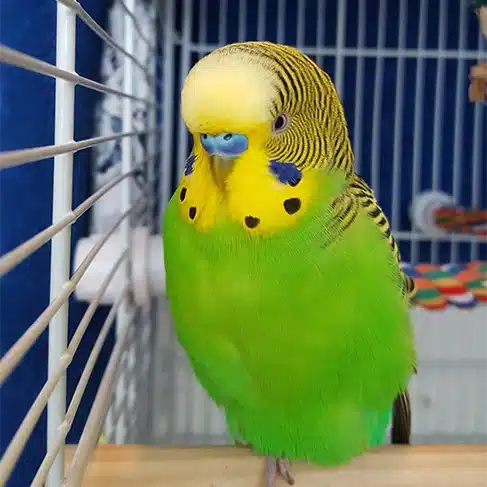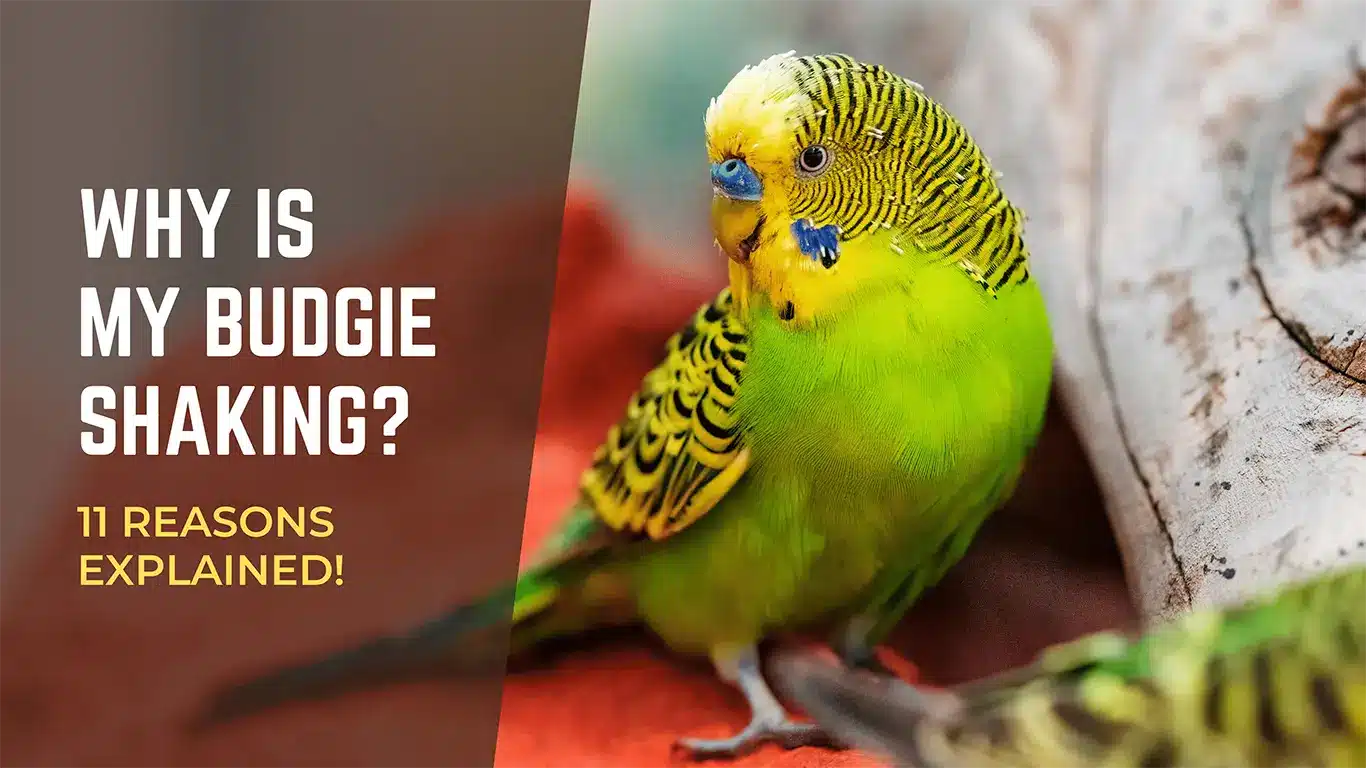When I was new to budgie-keeping, I got worried as soon as I saw one of my budgies shaking. And if you are here because you experienced the same, you might be wondering the same thing that I did: Why is my budgie shaking?
Budgies usually shake in different ways to mean different things. Sometimes, it’s because they are excited, content, or preparing for a fight. But it could also happen if the budgies are sick, worried, or scared. They may also tremble or shake if they are feeling cold.
So, what do you do when this happens? How can you tell whether it’s a normal shaking or something to be concerned about?
Well, I believe you will find all the answers in this article. So feel free to check it out.
Why Is My Budgie Shaking? – A Detailed Discussion
Budgies are elegant birds, but they are also sensitive to various things, especially in captivity. And from my experience, I have found the following 11 reasons why budgies usually shake.
1. Preparing For Flight
Like cats or bulls, birds, like budgies, also make pounce-like movements when they prepare to take flight. So you notice them shaking or trembling a bit when they do that.
2. Post-Preening Shaking
Preening or grooming is part of budgies’ daily routine and a way to keep themselves clean. After they are done cleaning, budgies shake themselves to remove the loose dirt and feathers. It is nothing to be worried about.
3. Excitement
Budgies also shake their tails fast and look like they are trembling whenever they feel excited. You might also see them moving up and down or rustling their feathers.
They also get a bit more vocal and make sweet chirping sounds. Generally, they show this kind of behavior when you reward them with something or feed them.
4. Shifting To A New Environment
If there is a change of environment, the budgies can get triggered. I often notice my budgies shaking a little abnormally when I move them to a new place. While it is completely normal, it is also necessary to give the budgie time to adjust to the new surroundings.
5. Temperature Sensitivity
Budgies are native to Australia and usually live in 70°-75° Fahrenheit. But they can also do well in 60°-65° Fahrenheit.
So you must provide them with the right temperature. If the temperature drops below the required level, the budgies will shiver from the cold.
6. Illness/Disease
You should also know that budgies suffer from a number of diseases. Some of them, especially parasitic or bacterial infections, cause the birds to shake, look weak, move abnormally, lose appetite, etc. If you see something abnormal in the budgie’s movement, make sure to consult a vet.
7. Pain
If the budgie gets injured or experiences pain, it will shake abnormally, make a loud sound when trying to touch it, get lethargic, lose appetite, etc.
Pain can also make the budgie aggressive, increasing its heat rate and blood pressure and causing it to shake more. That’s why it is vital to check with a vet and find the cause.
8. Stress/Anxiety
Loud or sudden noise, change of environment, new people, or companions can trigger stress and anxiety in budgies. This can cause them to move restlessly in the cage, get more vocal as though they are arguing, and shake. So, you must try calming them down because budgies can get aggressive and even lose feathers when stressed.
9. Fear
Shaking is also a response to fear as the budgies get tensed up, and their bodies release adrenaline. The shocks often cause their bodies and wings to shake in a vibrating motion. If that’s the case, try calming the budgies by ensuring the surroundings are calm and give them treats.
10. Mating Behavior
Over the years, I have learned that budgies don’t always shake or create shaking-like movements when there is something wrong. Head-bobbing or feather shaking is also part of budgies’ mating behavior.
11. Dietary Issue
The lack of nutritious food in daily diet can cause the budgies to suffer from health issues and get sick. As a result, they will begin to shake and lose weight over time. That’s why you should know what budgies eat and give them food accordingly.
I have written a detailed article about budgies diet. Be sure to check it out.
Is It Normal For A Budgie To Shake?
In some cases, it is normal for the budgies to shake, while in other cases, it is not. And knowing the difference is essential for all budgie owners. So, let’s take a look at the normal and abnormal shaking of the budgies.
When It’s Normal
- When they are eating
- During mating or breeding season
- During grooming
- When they are stretching themselves
- When taking a flight
When It’s Concerning
- Loud vocalization with shaking due to loud noise
- When the entire body is shaking for a long time
- Budgies losing weight and keep on shaking
- Shaking due to weakness
- Shaking and trembling after vomiting or diarrhea.
Can Malnutrition Cause My Budgie To Shake?
A healthy diet is vital to ensure your budgies remain active and do not suffer from any severe health issues. That’s why it is essential to give them nutritious food.
Without proper nutrition, budgies will lose metabolism and get weak. And eventually, they will suffer from various diseases.
To avoid that, you must know what budgies eat. Since budgies are omnivores, they can eat plants, fruits, vegetables, and insects. In captivity, you can give them seed or fruit pellets, chopped fruits and vegetables, etc.
What Do I Do If My Budgie Is Shaking Because It’s Sick?
By now, you know several reasons why budgies shake. Even though budgies can shake for normal reasons, it’s not always the case. It can also happen if the budgie is sick.
But if you see the signs of budgie’s sickness and think that’s causing the budgies to shake, it is natural to get worried. In such a case, the best thing to do is visit a certified vet.
You should avoid giving them any medicine or treatment without a professional’s advice.
Finally, you’ve reached the end of the article.
I hope it has given you enough information about why is budgie shaking and the reasons behind this behavior.

I’m Shajid Rahman, a happy owner of 6 beautiful budgies. I take care of this website to share tips, fun facts, and care guides about these birds.
Whether you’re a budgie lover or considering one as a pet, you’ll find helpful info here! I love these cute creatures, so I made this blog for Budgerigar fans. You can expect to get reliable information based on my years of experience. More About Me →

